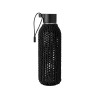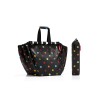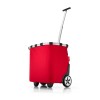Product successfully added to your shopping cart
There are 0 items in your cart. There is 1 item in your cart.
Last blog articles
5 Tips to reduce plastic waste
Published : 01/23/2020
Categories : Let yourself be Inspired

Everyone knows that recycling is our duty as citizens and, right now, the world needs us for a greater mission: reduce single-use plastics consumption. Cutting down on our plastic consumption applies not only to the shopping bags we use, but also to everything you purchase that’s wrapped in plastic packages. Yes, even that must be reduced! The main goal is to prevent more plastic from entering the oceans and killing more sea creatures. Did you get curious? Do you want to prevent this from happening? Don’t worry, we explain five ways to do it!
Tip 1 – Avoid using fruit and vegetable plastic bags and carry reusable shopping bags. Every time you go to the supermarket, do you put the fruits and vegetables in plastic bags? You do, right? But… do you need them? If you always carry two or three reusable shopping bags with you, you can place all of your groceries inside. This also applies to the shopping bags your ask for from the cashier at the time of payment and then throw away when you get home. The tip is to reuse the bags you already have at home to go shopping again. In&Out Cooking also suggest that you use reusable shopping bags. Reisenthel bags are big, very resistant and, at the same time, stylish.
.jpg)
Tip 2 – Buy products in bulk. There are so many products that are packed unnecessarily, contributing to overconsumption of plastic in the world. For example, have you ever seen packaged fruit such as bananas, grapes and even strawberries? What about leguminous, which are always packed in canning or plastic packaging? We can use the glass containers that we keep from jams to buy some bulk products. There are already numerous stores around the wordl where you can buy everything in bulk, just take your container or reusable bag with you. Usually, these stores have leguminous, flour, cereals, nuts, coffee, spices and even cookies, honey, teas and herbs. You have everything you need to start buying in bulk, you just need to take the first step.
.jpg)
Tip 3 - Read cleaning products labels and clothing labels. Many toiletries, such as scrubs and toothpastes, contain plastic microspheres that go down the drain daily. The water from the sewage is loaded with microplastics to rivers and seas, contaminating the environment in which thousands of marine animals live. The worst part is that these microplastics enter the food chain of animals, harming several organisms, including us humans. When it comes to the clothes we wear, we have to keep in mind that many of them are made of microfiber and synthetic fabrics, which release tiny plastic fibres in each wash. These plastic fibres eventually go to the sewers and, therefore, happens what we explained before. The ideal is to choose clothes made of 100% cotton and toiletries that aren’t composed of microplastics. Can you detect when the label contains polyethylene or polypropylene? Learn the history of microfiber in this vídeo made by The Story of Stuff Project.
Did you know that, according to Ellen MacArthur Foundation, it is estimated that, by 2050, the sea will have more weight in plastic than in fish?
Tip 4 - Do not use disposable products. Disposable plastic is present in our daily lives, but there are increasingly more options to replace it. Replace the ice cream cup with the eatable cone, replace the plastic cotton buds with the ones made of bamboo (already on sale on major retailers), and also replace the plastic plates, cups and cutlery you use for birthday parties or picnics with the ones made of paper or bamboo fibre. In & Out Cooking suggests this Biobu picnic set and this Stelton cutlery case. Many restaurants and cafes are no longer offering plastic drinking straws, but you don't have to end them at home - kids love it and adults do too. Choose to buy reusable straws, available for sale, in stainless steel, bamboo, paper and even hard plastic that you can reuse.
Tip 5 - Eliminate plastic bottles. Yes, the one you use every day and throw away. Purchase a sturdy, stainless or glass reusable bottle. You can fill your bottle at home and take it everywhere. This small gesture already makes a big difference.
Did you know that, every year, a billion plastic bottles end up in the oceans?
Tip 6 - Pass the message. Sharing this kind of information and influencing people is very important nowadays. Do it! Influence the people around you, it will make a big difference.
Commit to us to contribute to everyone's health and well-being - including yours.



